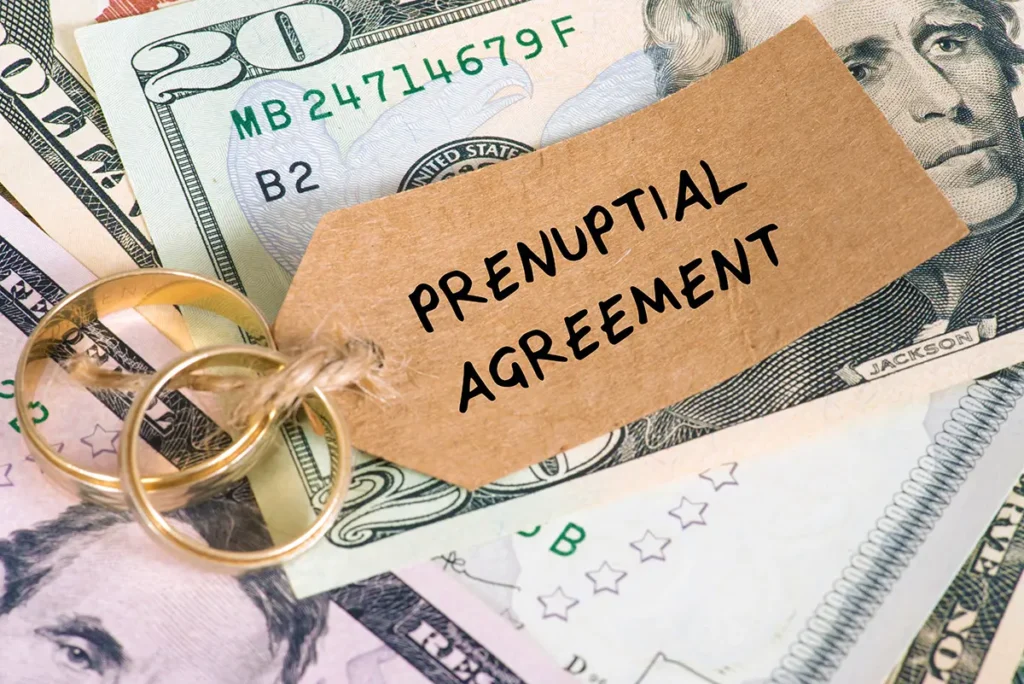Prenuptial agreements, or “prenups,” often get a bad rap—many tend to assume that they are primarily used by wealthy people as a way to leave their less-wealthy partner with few assets after a divorce. However, the truth is far more nuanced. Prenuptial agreements can protect both parties in a marriage, and for many, are a valuable addition to other types of financial planning. Below, learn more about what types of situations prenups tend to cover and why it can be so important to have one.
What Prenups Can Cover
Prenups are essentially just a contract—and like any contract the parties can come up with terms. A prenup may be as simple as fixing the value of each parties assets upon divorce or what property is separate and what jets divided. Prenups can also establish or disclaim spousal maintenance (also referred to as alimony) or exclude property that may go to children outside of the marriage.
Generally, the more specific a prenup is, the better. It can be hard to anticipate all the possible situations that may arise during a marriage, but the more factors that are addressed in the prenup, the fewer issues you will need to litigate later if you end up getting divorced.
Couples with substantial assets, family assets, or children from a prior relationship can often benefit the most from a prenup. Each state’s laws vary, and you may not want to put yourself at the mercy of your state’s laws if you end up divorcing. For example, if you do not have a prenup in place, a piece of personal property or land that has been in your family for decades may end up being awarded to your ex-spouse. Specifically providing for this property in a prenup (and a will, if you have one) will ensure that it remains in your family no matter what happens. If you do not have a prenup, your divorce will follow the state laws in the state your reside at the time of the divorce, not where you got married.
When Should a Couple Begin Working on a Prenup?
Telling your partner that you would like a prenup—or hearing that your partner wants a prenup—can be difficult. However, the earlier you have this conversation, the better; waiting until a week before the wedding may not give you enough time to find an attorney, detail what you would like the prenup to include, and sign it with your soon-to-be spouse. It is a good idea to start the process at least three months before your wedding date.
In many states, for a prenup to be legal, both partners need to be advised by separate attorneys—if your attorney drafts the prenup, advises you to sign it, and advises your soon-to-be spouse to sign it (without telling them they have the right to an independent consultation), the prenup could later be invalidated as coercive.
One way to frame the issue is not to say, “I want a prenup,” but instead to suggest that you and your soon-to-be-spouse each go to separate attorneys to learn about your options. Treating a prenup as just another aspect of financial planning can help reduce the sting while ensuring that you and your loved ones are legally and financially protected.
If you need help with any issue concerning a prenuptial agreement, contact us at The Law Offices of Patrick Markey, P.C. Our practice is dedicated solely to the practice of family law.
I help clients minimize the destruction of divorce whether it be through the collaborative law model, the court process or mediation. My focus is on complex family law cases and representing professionals and their spouses who value a proactive solution orientated approach to their divorce. Our policy is to provide prompt responses and regular status updates to clients. Keeping the client informed about their cases is the highest priority. We as a firm are accessible when needed. Clients want a speedy resolution to their divorce or family law matter without sacrificing the best possible outcome. I am a strong advocate of the Collaborative Law and mediation dispute resolution methods for their ability to custom-craft solutions, minimize conflict and usually reduce the time of a case. Not only are we experts on family law, but we understand the impact of divorce on children and we help client’s develop co-parenting relationships. Clients deserve to be treated with kindness and empathy during this difficult time. We as a firm represent clients in a professional, ethical manner. The firm uses the latest technology to save time and make the client’s experience easier.
Recognition:
*Selected as an Illinois Super Lawyer by Super Lawyers Magazine for 2024. This distinction is limited to the top 5% of lawyers in each practice area. In 2015, selected as a “Rising Star” which is only granted to 2.5% of lawyers. Super Lawyers has a patented multi-phase process that includes independent research, peer nominations and peer evaluations.
* Chicago Bar Association Milton H. Grey Award for Outstanding Project Leadership (2012).
Involvement
*Collaborative Law Institute of Illinois (CLII) Executive Board Member
*Center for Conflict Resolution (CCR) Volunteer Mediator
*Chicago Bar Association Judicial Evaluation Committee

